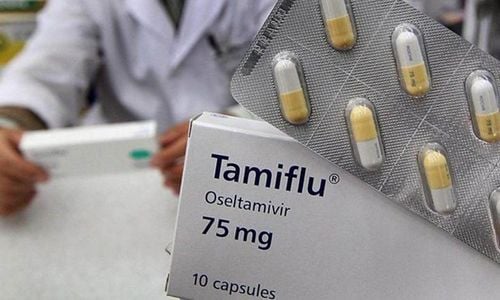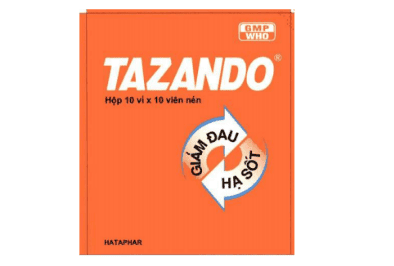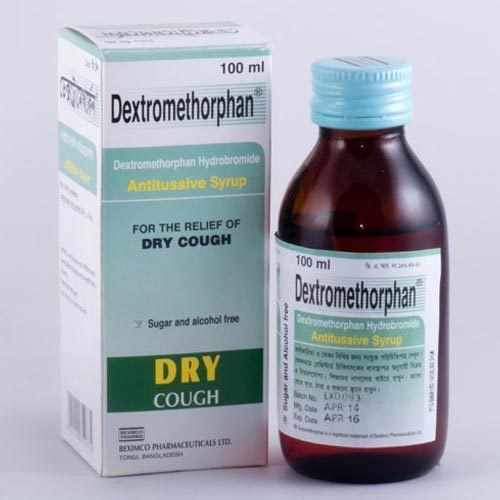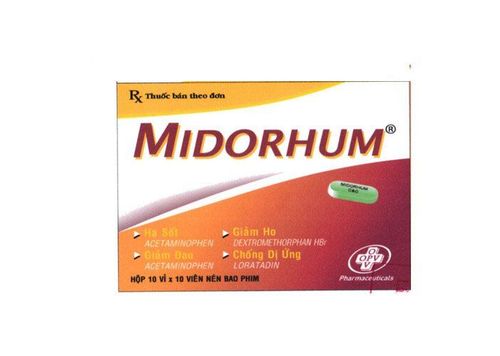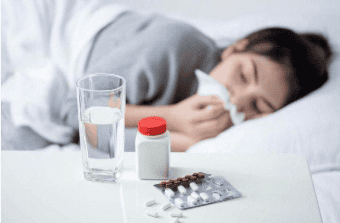This is an automatically translated article.
DM Max consists of two ingredients, dextromethorphan and guaifenesin, used in preparations to relieve cough. Among them, dextromethorphan is a non-opioid drug used as an antitussive drug through inhibition of cough receptors in the central nervous system. At the same time, guaifenesin is a drug that clears respiratory secretions by diluting it to become easier to excrete.
1. What is DM Max?
DM Max consists of two ingredients, dextromethorphan and guaifenesin, used together in oral cough preparations to relieve coughs caused by mild throat and bronchial irritation that can occur with the common cold. The details of each ingredient are described as follows:Dextromethorphan is a non-opioid drug that is used as an antitussive by inhibiting cough receptors on the central nervous system. Despite being related to opiate agonists, dextromethorphan does not exhibit the characteristics of typical opiate agonists. Dextromethorphan is useful in the treatment of chronic cough but has no expectorant activity. When taken orally at recommended doses for defined purposes, dextromethorphan is generally considered a safe and effective cough suppressant; however, the use of the drug in reducing cough due to upper respiratory tract infections is not supported. Guaifenesin is an expectorant that loosens and thins sputum and bronchial secretions for easier secretion or drainage from the respiratory tract. Along with dextromethorphan, Guaifenesin is used for cases of dry cough and the presence of persistent mucus. The results of several studies have supported active treatment with guaifenesin over placebo in the treatment of productive cough in patients with an upper respiratory tract infection. For this reason, many formulations of dextromethorphan have a combination of guaifenesin in both over-the-counter and prescription formulations.
2. How to use DM Max?
The required route of administration depends on the specific dosage form of the drug:
DM Max is taken orally and can be given with or without food; however, can be taken with food or milk to minimize gastrointestinal irritation. At the same time, the patient should drink plenty of water to ease phlegm.
Extended-release preparations need to be taken whole; Do not crush, break or break the tablet. Liquid-filled capsule immediate-release preparations also require swallowing whole.
Oral granular preparations need to open the package, sprinkle the entire contents on the tongue and swallow without chewing.
Liquid syrup preparations require the use of a calibrated oral measuring device (oral syringe, measuring cup or spoon) to give the correct dose.
Dosage in tablets, granules, syrup or immediate-release tablets:
Adults, adolescents and children 12 years of age and older: The usual dose range is based on dextromethorphan 20 mg orally every 4 hours. hours as needed or 30 mg orally every 6 to 8 hours as needed. The maximum dose is 120 mg of dextromethorphan per day.
Children 6 to 11 years old: Ingredients dextromethorphan 10mg orally every 4 hours as needed. Some dosage forms are not intended for use in children under 12 years of age.
Children 2 to 5 years: Ingredients dextromethorphan 5mg orally every 4 hours as needed. Some dosage forms are not intended for use in children under 12 years of age.
12-hour extended-release and biphasic oral dose:
Adults, adolescents, and children 12 years of age and older: Usual dose range with dextromethorphan 30 to 60 mg orally every 12 hours as needed. Do not exceed 2 doses every 24 hours.
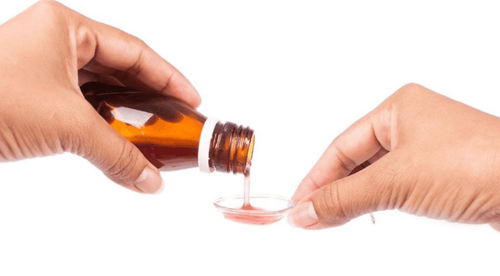
Thuốc DM Max cần được sử dụng đúng liều lượng
Maximum dosage limit:
Do not exceed the recommended dosage limit for each specific ingredient that has been prescribed. In general, the maximum dosage is established based on the dextromethorphan composition of the selected product. The following are general guidelines. Adults no more than Dextromethorphan 120 mg/day; guaifenesin 2.4 grams/day. Elderly: not more than Dextromethorphan 120 mg/day; guaifenesin 2.4 grams/day. Adolescents: no more than Dextromethorphan 120 mg/day; guaifenesin 2.4 grams/day. Children:
From over 12 years old: Dextromethorphan 120 mg/day; guaifenesin 2.4 grams/day. From 6 to 11 years: Dextromethorphan 60 mg/day. Do not use extended-release dosage forms. 2 to 5 years: Dextromethorphan 30 mg/day orally. Do not use extended-release dosage forms. Under 2 years: Do not use because safety and effectiveness have not been established.
3. Possible side effects when using DM Max
Adverse events are uncommon with DM Max or dextromethorphan plus guaifenesin when used at therapeutic doses. Among them, nausea is the most common side effect, but even this side effect is not often encountered.
Other side effects reported were mild abdominal pain or discomfort, dizziness, drowsiness, headache, rash, vomiting and urticaria.
Dextromethorphan is associated with serotonin effects on the central nervous system but such adverse effects are very rare when used exactly at the labeled dosage for cough suppression.
Overdosage of DM Max may lead to dextromethorphan-induced adverse events consistent with serotonin syndrome and CNS toxicity including: confusion, irritability, irritability, nervousness, restlessness, nausea and vomiting and arrhythmia. Serotonin syndrome is more likely to occur when dextromethorphan is used in combination with drugs with serotonin activity. Very high doses of DM Max can cause hallucinations, respiratory depression, or convulsions.
Excessive use of DM Max or an overdose of guaifenesin can lead to kidney stones. The composition of kidney stones has been reported to contain active metabolites of guaifenesin.
On the other hand, the combination of dextromethorphan and guaifenesin should not be used for persistent or chronic cough, such as a cough as a result of smoking, asthma, emphysema or chronic bronchitis, or any other condition any other cough associated with excessive secretions, unless under the supervision of a healthcare professional. A cough that recurs or persists (lasting more than a week) or a cough with fever, nausea, vomiting, rash, or persistent headache could be a sign of a more serious condition and should be evaluated by a doctor. price.
Because dextromethorphan is extensively metabolised in the liver, the combination of dextromethorphan and guaifenesin should be used with caution in patients with liver disease, which may increase the risk of toxicity in these patients.

Thuốc DM Max có thể gây ra một số tác dụng phụ không mong muốn
Because the combination of dextromethorphan and guaifenesin can cause dizziness or confusion, patients should be warned to exercise caution when driving or operating machinery.
The safe use of cough and cold products during pregnancy has not been established; Therefore, dextromethorphan and guaifenesin should be used during pregnancy only if clearly needed. Guaifenesin used for expectoration is associated with a low likelihood of neural tube defects and inguinal hernias. However, the evidence is insufficient and caution should be taken to avoid this drug during the first trimester unless the potential benefit outweighs the risk.
During lactation, it is only necessary to consider whether guaifenesin alone is sufficient. Guaifenesin is found to be compatible with breast-feeding at commonly prescribed and over-the-counter doses. For the use of dextromethorphan in lactating women, data are currently limited. However, dextromethorphan is generally considered compatible with breastfeeding if usual antitussive doses are not harmful to the nursing infant. However, some cough products with dextromethorphan often also contain alcohol and these products should be avoided while breastfeeding.
Dextromethorphan should be used with caution in patients on MAOI inhibitor therapy, preferably contraindicated in patients receiving traditional non-selective MAO inhibitors (eg, isocarboxazid, tranylcypromine, phenelzine).
4. What should be observed when using DM Max?
Since DM Max is an over-the-counter drug, you can self-medicate according to the directions on the label but tell your doctor if symptoms do not improve within 5 days or if they get worse . On the other hand, if you have a high fever, skin rash, persistent headache or sore throat, seek medical attention as soon as possible.
While taking DM Max, you need to drink 6 to 8 glasses of water a day to help loosen the mucus.
Patients may experience drowsiness or dizziness when taking DM Max. So do not drive, use machines, or do anything that requires alertness until you have stopped taking the medicine. At the same time, do not drink alcohol or use alcoholic beverages, do not stand or sit up quickly when taking the drug, especially for elderly patients.
Possible drug interactions when used with DM Max
Do not take DM Max with any of the following drugs:
MAOIS such as Carbex, Eldepryl, Marplan, Nardil and Parnate
Procarbazine
Drug classes Treatment of depression or other mental disorders
Other over-the-counter cold or allergy medications
In summary, DM Max consists of two combined ingredients, dextromethorphan and guaifenesin, which have the role of thinning phlegm and reducing phlegm. a cough . This is an over-the-counter medicine used to improve symptoms of colds or allergies. However, it is necessary to monitor the patient's symptoms while taking the drug and seek medical attention for aggressive treatment if the condition does not improve after a few days of taking the drug.
Please dial HOTLINE for more information or register for an appointment HERE. Download MyVinmec app to make appointments faster and to manage your bookings easily.
References: mskcc.or, wellrx.com, webmd.com



